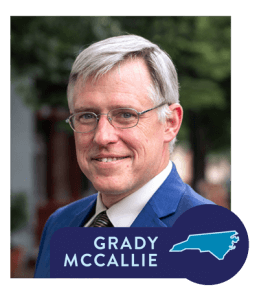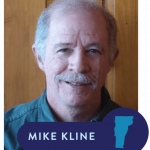Lessons from the Network: Grady McCallie
Grady is the Policy Director at North Carolina Conservation Network. NCCN supports, trains, and coordinates diverse groups and directly advocates to achieve equitable and sustainable solutions for our environment.
This interview was conducted on April 28, 2022 – before the wetland protections rule was rolled back in June of 2023. It has been lightly edited for clarity and brevity.
River Network (RN): To get started, can you give me a brief introduction to who you are and your role at NC Conservation Network?
Grady McCallie: I’m the policy director. I came on board in 2000, and most of my work involves direct advocacy here in North Carolina. I got involved because I’ve always been interested in water policy and protecting this most critical resource. One of the big roles that North Carolina Conservation Network plays is coordinating and facilitating collaboration among environmental groups in North Carolina.
RN: Do you primarily work at the state level?
Grady McCallie: We mostly work on state policies, but we work as part of a coalition on National issues, and occasionally assist local groups working at a municipal level to further their local policy priorities.
RN: NCCN worked to implement this gap-filling wetlands provision in NC. What was the impetus to develop and implement this policy?
Grady McCallie: North Carolina state law has for years included a broad definition of ‘waters of the state’ that includes wetlands of all stripes, and state law prohibits unpermitted impacts to those waters. For years, the state has provided the authorization under state law through 401 certification piggybacked on 404 permits issued by the US Army Corps of Engineers. The narrowing of federal jurisdiction under the Navigable Waters Protection Rule (NWPR) created a problem for developers: those wetlands still couldn’t be harmed without state authorization, but without 401 coverage, there was no pathway for applicants to obtain a state approval. State environmental managers responded in May 2021 by adopting a temporary rule establishing a state permitting process for those wetlands, and adopted a permanent version of the permitting process in January 2022.
RN: How did you build support for this rule?
Grady McCallie: This rule was challenging to message for an environmental audience, because state regulators weren’t proposing to protect wetlands that were otherwise unprotected: they were establishing a permitting process to allow impacts to wetlands that were, as an unintended fallout from the NWPR, untouchable. At base, we support the Clean Water Act’s core approach to managing impacts: avoid if possible, minimize what can’t be avoided, and compensate for those. The state wetland permitting rule is designed to mirror the federal rule closely, to provide a way for projects to move forward while protecting wetlands’ functions and benefits.
In 2016 and 2018, North Carolina experience two 500+ year hurricanes and floods, so a lot of state legislators and decisionmakers have had direct experience of the importance of wetlands for flood attenuation. In general, across the political spectrum, North Carolinians know that wetlands help reduce flooding, want them protected, and also don’t want an absolute prohibition on their development. Our messaging emphasized that balance, underpinned by the need to protect wetlands for their many benefits, especially flood reduction.
To make the case to environmental managers, we mobilized traditional environmental activists, but also people who worked in fisheries, wetland mitigation scientists, and consultants who help developers design projects with impacts to wetlands. We kept state legislators in the loop, but we didn’t get any comment letters from them. Because the legislature has the ability to pass a law that could override this regulation, we did discuss it with them, and the feedback was largely positive.
RN: Are there other organizations that you partnered and built effective coalitions with? If so, what work did you do to build trust, designate roles and responsibilities, and successfully come together?
Grady McCallie: Our partners at Southern Environmental Law Center (SELC) have deep expertise in wetlands law and policy, and have led a team of advocates from multiple organizations. The team included advocates from national organizations (EDF, American Rivers), state-level groups (us, the NC Sierra Club, the NC League of Conservation Voters), and river-basin groups (represented on biweekly calls by Sound Rivers). The NC Wildlife Federation brought a hook & bullet perspective and credibility with decisionmakers on both sides of the aisle. The Carolina Wetlands Association, founded by scientists and consultants who work on wetlands issues, provided crucial scientific expertise and well as a practical grounding in how the permit process works for applicants.
RN: Can you describe what implementation has looked like so far? Are you continuing to work with affected communities and/or state agencies to make sure the rule is actually being well implemented?
Grady McCallie: North Carolina’s rulemaking process involves a final stop in front of a body called the Rules Review Commission (RRC). All of its members are appointed by the legislature, but it passes judgment on rules in the rulemaking process, and it is housed in the Office of Administrative Hearings, so there have long been questions about its constitutionality. The RRC has recently had significant staff turnover and has taken some newly anti-regulatory stances; in May 2022, the RRC objected to the permanent state wetlands permitting rule. We think that objection is legally simply wrong; state environmental managers have until sometime in July to determine their next move. In the meantime, with the Sackett case placing the future contours of federal jurisdiction in doubt, we see it as more crucial than ever that the state put a permanent wetland permit process in place to handle any gaps created by new changes in the limits of federal protections.
RN: What are the biggest hurdles or challenges facing your organization as you work on jurisdiction issues?
Grady McCallie: In the case of the temporary rule, there was a small group of wetlands consultants who were anti-regulatory, and they argued NCDEQ had no authority to adopt the temporary permitting rule.
By the time state environmental managers voted on the permanent rule, a larger coalition weighed in against it: the Homebuilders, Chambers of Commerce, Farm Bureau, and Aggregates Association (sand & gravel miners). They argued the vacatur of the NWPR by a federal court in late 2021 made the permanent rule unnecessary, but that’s factually wrong. The US Army Corps of Engineers, Wilmington District, has said it does not plan to revisit 300+ determinations, made while the NWPR was in effect, that specific wetlands were outside federal jurisdiction. Without a state permitting process, those projects would lack a path to obtain state authorization, short of starting the federal process from scratch.
RN: What are the major campaigns or policy priorities that you’re currently working on? What kind of strategies are you using to advance your goals?
Grady McCallie: We continue to press our state environmental agency to clamp down on water discharges of per- and poly-fluorinated compounds (PFAS). We’re also working on nutrient pollution in estuaries and large reservoirs, and in doing so we’re encouraging NCDEQ to shift their emphasis to overall water quality rather than trying to work on a single pollutant at a time. And of course, like almost all state environmental agencies, NCDEQ needs more adequate funding, so we’re pushing for greater appropriations from our state legislature.
We’re also in a place where we’re seeing some positive movement on stormwater regulations. Municipal Separate Storm Sewer Systems (MS4) are slowly – very slowly – moving from routine use of detention basins to manage stormwater towards approaches that emphasize volume-matching, nature-based solutions. Parallel with that, we’re also seeing the state place a greater emphasis on local programs keeping up with the long-term maintenance of stormwater control measures across their jurisdictions.
RN: What’s your biggest accomplishment to date? What aspect of your work are you most proud of?
Grady McCallie: I’m grateful for the culture of collaboration among advocates in North Carolina, both when we win and when we occasionally don’t win. All the progress we make here is due to collaborative efforts.







